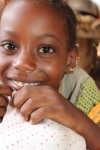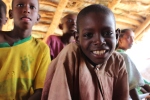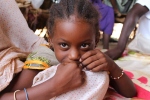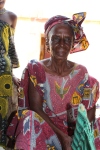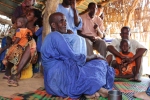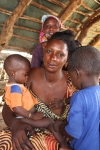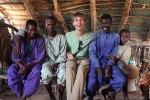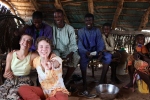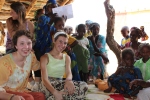October 26 marked this year’s Tabaski, a celebration of Abraham’s loyalty to god which he demonstrated by almost killing his son Isaac/Ismeal at God’s request. Tabaski is a huge holiday in Islam celebrated by purchasing new, nice clothes, eating a big meal, being charitable, and slaughtering a sheep/cow/goat in commemoration of the sheep that ended up getting scarified instead of Isaac/Ismeal. You can probably imagine that i had feelings about sheep getting slaughtered in the courtyard of my family’s house, right outside of my bedroom door, as it were. Not only am i a vegetarian, i’d also never seen an animal slaughtered in person.
My mom told me past host students had avoided watching the slaughter, but i resolved to watch the whole process very closely. It was a matter of principle: shouldn’t i be familiar with something i’m so vehemently against? And besides, the slaughter is more or less the focal point of the holiday, from what i observed, so i think i would have felt sort of disingenuous if i’d skipped it. And while i expected the killing to be an upsetting but pretty straightforward experience, it turned out to be a whole lot more perplexing and evocative than i thought, and not even because of my personal politics. As it turns out, i find it generally very affecting to watch a living creature die—or, more accurately, get killed. That was what got me the most: watching the eyes of the sheep after their throats had been slit, seeing them struggle, trying to breathe, and eventually giving up.
I stood right among the men my family hired to butcher the animals, observing and taking photos. I didn’t cry, but i did feel faint a few times, not so much from disgust as just being purely overwhelmed at the scene before me, which intersected life and death in a way i’d never quite experienced before.
And just for the record, i find the practice of slaughtering one’s own sheep to be refreshingly honest. Anyone who’s ever celebrated/participated in Tasbaki knows exactly what goes into meat eating, and is free to make their own judgements from that knowledge. So while i abstained from the barbecued ribs my family smashed on a few hours after the slaughter, i didn’t feel any particular ill will toward them for partaking.
The other holiday i celebrated was less thought-provoking but just as powerful and, for me, slightly more lovely: Thanksgiving! Thanksgiving is my absolute favorite holiday, and this past one being both my first without my family and my first abroad, i wanted it to be special. “Special” ended up translating into spending a lot of money on imported ingredients like cheddar for mac and cheese and fresh cream for green bean casserole, but hey, it only comes once a year. I also managed to slap together a sweet potato caramel pie (made out of the infuriatingly mysterious white Senegalese sweet potatoes), which i was pretty proud of. We did a potluck-style celebration at our friend Tim’s apartment, complete with the aforementioned dishes, apple pies, roast chicken, stuffing, homemade rolls, bissap sauce (Wolof word for hibiscus, which is really popular here), mashed potatoes, gravy, roast veggies, and two types of salad. Naar na lool. Everyone had more than enough, and everything tasted so much like America.
Even though i missed my loved ones at home, i couldn’t really ask for a better celebration with my family of friends in Dakar—complete with imported New England foliage!














